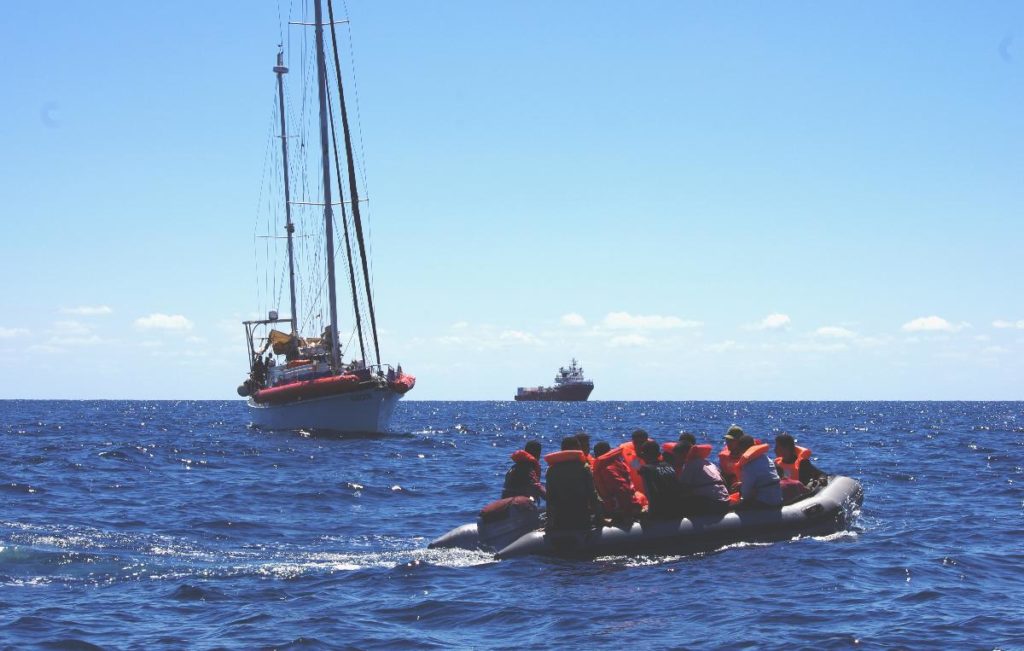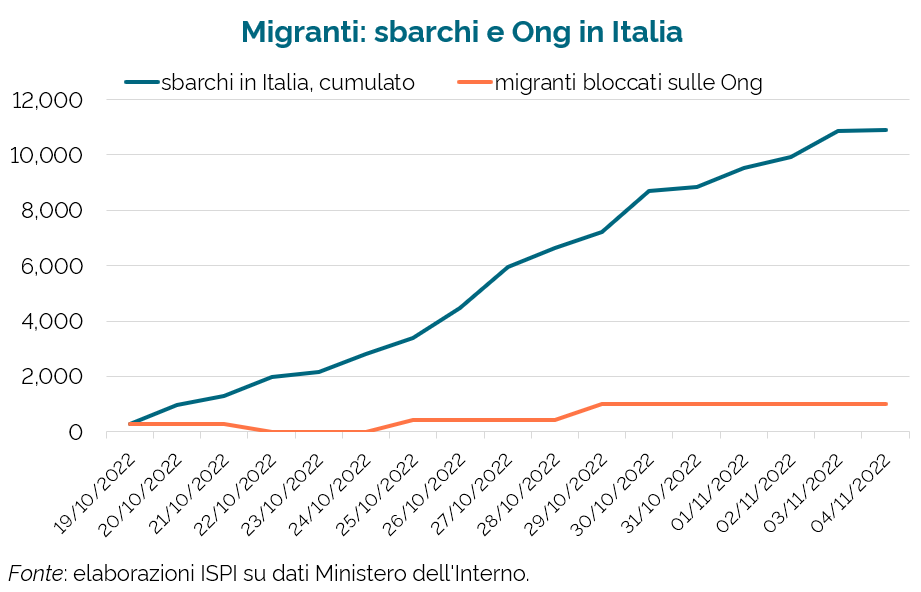by Pietro Desideri, volunteer onboard the Nadir
«Crack» stems from my experiences and emotions aboard the sailing ship Nadir, as a volunteer with the German association RESQSHIP, during a monitoring, search and rescue mission. It is a five segments story that comes out every Wednesday in November, starting on 2.11.2022: an infamous day for the renewal of the agreements between Italy and Libya. «Crack» is part of what I would like to say to Fortress Europe 1.

This article concludes Crack. I wanted to dedicate it to the elephant in the Central Mediterranean: Fortress Europe.
Political hostility against the civil fleet vessels is resurgent once again. In Italy, the Piantedosi directive a few weeks ago could start a new season of stand-offs, closed ports, confrontational tones and “residual humanity”. Governments’ hostile stances have a consequential impact on the civil fleet. In recent years, the list of vessels that have been administratively detained and had to end their SAR voyages 2 is long: Alan Kurdi, Sea-Watch, Sea-Eye, Dignity 1, Vos Hestia, Aquarius, 3.… During the first six months of 2022 alone, more than 19 cases have been registered where civil fleet vessels with rescued people on board have not been promptly assigned a port of safety, having to wait more than twenty-four hours and in many cases more than a week 4.

Why so much hostility? From an operational point of view, the civil fleet is hardly an imaginary enemy to the state policy of closed borders. It does not constitute a pull factor (to employ populist vocabulary, sea taxis are a fairy tale). One needs only to consult the number of arrivals and the presence of SAR vessels in the Mediterranean: there is no correlation. A striking example is the increase in arrivals after the end of Operation Mare Nostrum (Oct. 31, 2014) despite the significant downsizing of SAR assets in the Mediterranean. The civil fleet is also not rescuing a significant number of people: from January to August this year, the number of people who arrived in Europe after being taken on board NGO vessels is just 16 percent 5. Even more significantly, the real border is the one that runs much more south, the one woven by Fortress Europe to prevent, hinder, and make it painful for people to move. The is a border that no SAR voyage even scratches.
It is a border that also involves attaching strings to aid for international cooperation to hamper free movements of people, becoming a very tangible for of economic blackmailing -that is the case, for example, of Niger. It is a border that includes opaque agreements with Tunisia and those with Libya. It is a border that exploits UN agencies to implement “voluntarily” repatriation programmes for people who have suffered so much on their journey that they have lost the hope of making it to Europe. It is a border of endless and useless queues in front of embassies to obtain an entry visa that will never be issued-these are the “legal channels“. It is a border intimately linked to economic exploitation, from the depletion of fish resources in Senegal to ENI’s energy extractivism in Mozambique.
The state is not attacking NGO vessels for their operational achievements only, but because they represent a political actor that cries, “the king is naked“. Indeed, they denounce the political and economic looting of a part of the world that likes to call itself land of human rights. NGO vessels operate at the frontier, where European policies materialize in brutal ways, and thus bear witness to the deadly racism of the externalization of borders, to the neocolonialist parody of “let’s help them at their home” arguments.
The Mediterranean functions as a barometer for the policies that Fortress Europe deploys to make itself always more impenetrable. Following a pattern that seems almost as iron as a physical law, the closure of a migration route determines the opening of another, more dangerous one. Until 2020, access to Europe mainly went through the Turkey to Greece route: the stretch between the two countries is short, from the beaches of the island of Lesvos one can see those of Turkey. Since 2020, the aggressive pushback policies of Greek authorities – implemented to this day – have atrophied this route, and most flows to enter Europe have been channeled through the central Mediterranean 6. Deaths have increased. European policies now strive to close even this entry point, through, for example, the so-called Libyan coast guard. The impact is clear: more and more boats are leaving from countries as far away as Egypt or Lebanon, or taking the Atlantic route to the Canary Islands. Last year, this latter route registered a 20 percent mortality rate 7.
NGO vessels document, mobilize, and keep the spotlight on a racist and neocolonial system that extends far beyond the Mediterranean basin. Those who subscribe to the cultural and political horizon of the civil fleet subscribe to the ideals that most crack Fortress Europe: those that begin with the freedom of movement.
- The opinions contained in these articles are personal
- I have previously employed the common terminology of “SAR mission”. Because meaning of the word “mission” is tainted by a long history of colonial discourse, I am happy to use alternatives as “SAR voyages”
- June 2022 Update – Search and Rescue (SAR) operations in the Mediterranean and fundamental rights, European Union Agency for Fundamental Rights (giugno 2022)
- June 2022 Update – Search and Rescue (SAR) operations in the Mediterranean and fundamental rights, European Union Agency for Fundamental Rights (giugno 2022)
- Dossier Viminale. Un anno di attività del Ministero dell’Interno (1 agosto 2021 – 31 luglio 2022)
- Infographic – Irregular arrivals to the EU (2008-2022), European Council (novembre 2022)
- Radio Melting Pot: Il Senegal e i pescatori con le piroghe. La trasmissione del mese di maggio 2022
